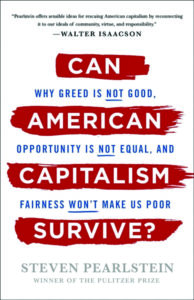Can American Capitalism Survive?

BY STEVEN PEARLSTEIN
ST. MARTIN’S PRESS, 2018
205 PP.; $27.99
Steven Pearlstein’s Can American Capitalism Survive? Why Greed Is Not Good, Opportunity Is Not Equal, and Fairness Won’t Make Us Poor is as mildly unconventional as one could expect from a Washington Post business reporter of three decades. The book is solidly capitalist and aims to preserve the US version of that economic system, but Pearlstein mostly wishes that the economy that had prevailed until Ronald Reagan was elected president had continued advancing along the path it was on.
For those who are economics-challenged, this is the book to read. Despite his admittedly less-than-scientific approach, Pearlstein presents a broad survey of research on the main issues in the book. (That said, I’m unprepared to comment on how complete it might be, given the vast subject matter).
Starting with the issue of greed, the book recounts how even Adam Smith, the eighteenth-century founder of capitalist thought, denigrated greed. Pearlstein’s most important point on the issue is that US corporate leaders have come to elevate advancing stockholders’ interests almost to the exclusion of all other concerns and in the process decided that success at doing so deserved a king’s ransom.
Next, Pearlstein details the extent of income inequality, itself a complex issue. “[I]f income distribution in the United States had remained the same as it was in 1979, about $1 trillion more would be going each year to the bottom 80 percent of households, increasing their current incomes by almost 25 percent,” he points out. On the policy causes behind increasing inequality, the book is a good reminder that the conservative revolution in full swing under President Trump really got going under Reagan. Certainly, Pearlstein’s critique of conservative economic policy changes under Reagan and onwards comports with a humanist view of the issues.
The bulk of unpaid worker compensation, of course, has gone to the 1 percent. Pearlstein cites a study showing that from 2000-2002, the combined total compensation of the top-five executives at public US firms with market capitalization of more than $50 million averaged an astonishing 12.8 percent of their firm’s net income. One result has been the growth of the financial industry to service the billionaires needing new places to invest their burgeoning wealth. That growth has drained resources from other private and public investment.
Certainly, Pearlstein’s attribution of causality and assertion of bad consequences are correct, but as the world grows richer, capitalism chokes on the accumulated wealth. He misses the fact that capitalism only works when the distribution of wealth and income is unequal. If too many become just wealthy enough, not enough will have reason to do the work that needs to be done. The fact is that capitalism, American or otherwise, cannot survive income equality.
 Pearlstein also covers the increasing concentration of business globally, which is another big factor in income inequality. As the number of business entities shrinks (and conglomerates grow), the number of business management positions decreases while the salaries of those in the remaining positions go up. Furthermore, concentration of the financial industry leaves fewer of the smaller regional and local banks that have traditionally made the vast majority of small business loans essential to new job creation.
Pearlstein also covers the increasing concentration of business globally, which is another big factor in income inequality. As the number of business entities shrinks (and conglomerates grow), the number of business management positions decreases while the salaries of those in the remaining positions go up. Furthermore, concentration of the financial industry leaves fewer of the smaller regional and local banks that have traditionally made the vast majority of small business loans essential to new job creation.
Pearlstein next addresses individual opportunity and examines the growing evidence that one’s circumstances at birth are the greatest factor in individual economic success: “[D]espite elimination of most legal barriers to equality of opportunity, the luck of which parents you were born to continues to play an outsized role in determining economic success.” Being born rich, white, and male in a country like the United States is tantamount to winning the lottery. Tied to the decline of class mobility, one’s birth is increasingly one’s economic fate.
Pearlstein supports some level of egalitarianism but also recognizes that differences in natural individual abilities will always be a factor in one’s likely success over a lifetime. The difficult question he poses (and fails to answer) is: How much inequality is acceptable? In any event, the removal of legal barriers to women, minorities, and other groups facing discrimination is clearly not enough. The connections and seed-money that rich families can offer their children are relatively unacknowledged advantages that people from lower classes don’t enjoy.
Furthermore, corporate executives have increasingly used their power to withhold their corporations’ benefits from the workers who actually make things and provide the services. The most damning evidence may be that worker pay stopped growing in 1979 while worker productivity has continued to rise at its usual pace. The gap continues to grow and is a clear indication of the source of inequality in the current form of US capitalism (not to mention, a basis for social discontent capable of inducing some workers to vote for Donald Trump).
Income and wealth inequality have also created greater barriers to political solutions by directing so much cash to the upper class, they feel no compunction about using it to make what Pearlstein, tongue-in-cheek, calls “political investments.” These plutocrats “have brought to power politicians at all levels of government who have embraced globalization, weakened the social safety net, eroded the minimum wage and made it harder for workers to form unions, while reducing investment in public goods.” The result is that “even conservatives regularly complain about the ways in which large swaths of the economy have been ‘captured’ by insiders who manipulate the levers of government to restrict competition, hoard opportunity or benefit insider dealing.”
But Pearlstein did not write his book to merely analyze whether US capitalism can be saved. He wants to talk about the solutions he thinks will save it. In that direction, Pearlstein argues that growth and fairness don’t have be trade-offs. That argument exemplifies his assumption that what capitalism really needs is a tune-up rather than an overhaul. He never questions the need for growth, a central tenet of capitalism the world over, yet that central idea that growth is necessary is a big concern of social democrats, not to mention socialists.
Pearlstein advocates three principles that must be taken into account in order to save capitalism. The first has to do with bringing the personal and the social back into balance by replenishing social capital through community trust-building approaches. The second is about reducing income inequality, and the third focuses on emphasizing mechanisms that pre-distribute income (i.e., raise pay) rather than redistribute income (i.e., tax income). Within these constraints, he proposes a variety of public policy cures for saving US capitalism.
His solutions are familiar: limiting campaign contributions, establishing both universal public service and guaranteed universal basic income, incentivizing businesses to share profits with all employees, changing primary and secondary school districts to mix neighborhoods of different ethnicities and classes, busting up monopolistic corporations, loosening patent and copyright law, and diluting the focus of corporate management on maximizing short-term stock prices. Noticeably absent is any policy that increases workers’ power in corporate management, whether the old union model, the European policy of requiring worker representation on corporate boards, or anything else. His proposals only nibble at executive power in corporations.
Nevertheless, some of his favored solutions are humanistic enough. For example, the signers of the 1973 Humanist Manifesto II called for a “minimum guaranteed annual income.” But Pearlstein misses the political implications of refusing to call out corporatism. Given that full-blown corporatism is a key element of fascism, Trump’s introduction of fascistic elements into public discourse justifies even more vocal and organized opposition to the corporatists in mainstream political parties. Only a movement capable of stopping the corporatists will be strong enough to save US capitalism, much less usher in more egalitarian policies of a social democratic or socialist nature.
